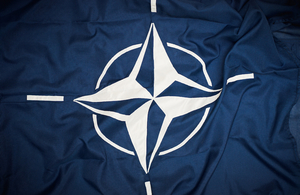UK Ministers lead NATO charge on innovation
Defence Secretary Ben Wallace and Foreign Secretary Dominic Raab have backed NATO’s vision of a technologically advanced, globally focused Alliance equipped to confront threats of the future.

NATO leaders will meet at a Summit later this month
Speaking ahead of the first gathering of NATO leaders since London 2019 taking place in Brussels later this month, Mr Wallace and Mr Raab met virtually with Allied counterparts to discuss how the Alliance will continue to adapt to the era of systemic competition – and how the UK will be a steadfast partner in leading that process.
The recently published Integrated Review into security, defence, development and foreign policy, as well as the accompanying Defence Command Paper, placed NATO at the heart of the UK’s vision for its role in the world over the next decade.
Defence Secretary Ben Wallace said:
Our recently-published Defence Command Paper placed working with international partners and committing to modernisation as fundamental principles for our Armed Forces. I am pleased that these are principles that NATO shares.
The UK will continue to be one of NATO’s most active Allies. As the Alliance strengthens its approach to deterring the threats of today, looks ahead to the future, and grows its capabilities in new domains, our Armed Forces will be at the forefront of the collective response to shared threats.
Foreign Secretary Dominic Raab said:
The UK is supporting and reinforcing NATO as we rise to the challenge of tackling hostile states like Russia, whilst also adapting to face new threats - from dangerous cyber attacks to poisonous misinformation, put about by those who want to undermine our way of life.
Cyber defence
As part of that adaptation process, the Defence Secretary agreed with counterparts a new NATO Cyber Defence Policy which recognises the need for Allies to have an active and shared approach to cyber defence, from improved resilience to offensive cyber capabilities, as part of our collective defence. This closely aligns NATO to the approach detailed in the UK’s Integrated Review, and will equip the Alliance to respond to activities below the threshold of traditional conflict.
Conflict-related sexual violence (CRSV)
Defence ministers also approved an Allied policy on Preventing and Responding to Conflict-Related Sexual Violence (CRSV).
The UK, in line with its objective to be a force for good in the world, has driven the ambition of this policy which demonstrates that NATO is ready to play its role in effectively preventing and responding to these brutal crimes, today and in the future. The policy will ensure that NATO personnel are trained on how to treat victims and survivors, to help ensure they get the support they need, and when necessary to protect them and provide emergency assistance.
Hostile states
Foreign Secretary Dominic Raab called on NATO allies to take action and respond to Russia’s malign activity, including using political tools at their disposal.
He set out Russia’s unacceptable behaviour including the recent military build-up in Ukraine, GRU officers being behind the deaths of two civilians and an explosion in the Czech town of Vrbetice, and the limiting of staff at the US and Czech Embassies – defying the Vienna Convention on Diplomatic Relations
The Foreign Secretary also called for a strong, united response from Allies to the forced landing of a Ryanair flight in Minsk, by the Lukashenko regime in Belarus.